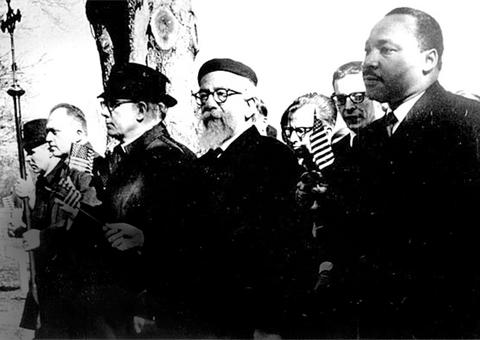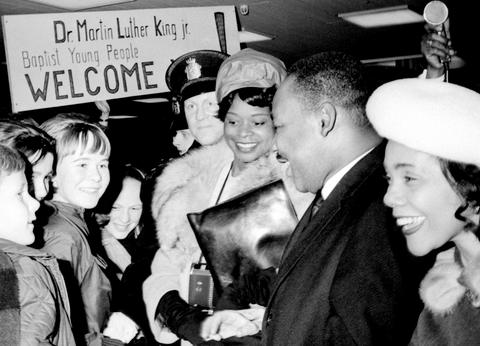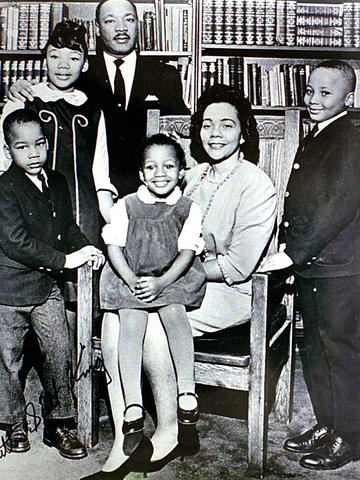Jesse Epps will be in New York on Thursday afternoon to speak about the future, carrying a credential from history.
He spent the late afternoon of April 4, 1968, in Room 306 of the Lorraine Motel, in Memphis, Tennessee, talking with Martin Luther King Jr about a march in support of the city's sanitation workers, who were striking for wages that would permit them to get off welfare and live in homes with indoor toilets. Just a week before, an earlier march turned into a bedlam, with stores looted, the crowd gassed and King hustled into a car by aides. For King, the event had been an embarrassing, dispiriting rout. He came back to Memphis to salvage the strikers' cause and his reputation.
Seated in that US$13-a-day room, Epps assured King that this time all the churches in town were rallying behind the strikers. "We talked about the fact that the safety and security had come a long way from where we had begun," said Epps, a labor organizer who had been sent to Memphis by the American Federation of State, County and Municipal Employees.

PHOTOS: AP AND NY TIMES NEWS SERIVCE
They wound up their meeting, and King declined an invitation to dine with Epps. He was already due at the home of a minister for supper. He washed up, knotted a fresh tie. A few of his people were in the parking lot outside, so he stepped onto the balcony outside Room 306 to tell them about the dinner plans. A single shot brought him down.
The echoes of that instant have carried 40 years. They can be heard around New York in the most casual of conversations about national politics, 2008: among strangers in a subway car, friends at dinner, people on their jobs. For some, the very strength of Barack Obama's campaign for the Democratic presidential nomination has dragged the thought of violence out of the shadows of the unspeakable.
A church worker and military veteran who is rooting for Obama said last week in Harlem, "Obama, I hope you don't get a bullet."

PHOTOS: AP AND NY TIMES NEWS SERIVCE
A much younger man, Joseph Solomon Jones, 25, held in the same thought high hopes and pure fatalism about the Obama campaign.
"He's very educated, very fluent in what the people want," said Jones, a college student in Brooklyn. "Obama, I want him to be president. First black president, all right, I'll take that. Even though he's going to get shot after that."
Now 71, Epps, who is due to speak at a King commemoration at Trinity Church on Wall Street that is being sponsored by the city's sanitation workers union, said that the world had been reborn many times since 1968. Yet he sees how the anxiety over Obama's safety runs in counterpoint to the elation over his successes. "That is a question I am hearing among the brethren," he said.

PHOTOS: AP AND NY TIMES NEWS SERIVCE
Modern history does not permit such worries to be brushed off, regardless of whether the source of danger is seen as some dark unnamed force, or simply a deranged person driven to lash out at a Kennedy or a King, a Wallace or a Reagan.
Alma Powell, the wife of Colin Powell, spoke bluntly about her fears in 1995 when Powell was weighing a run for the Republican presidential nomination. "He would probably be at much more risk than any other candidate because of being a black man in this society," Powell said. "A lot of crazy people out there."
In a speech on Sunday night, Michelle Obama, the wife of Obama, lightly traced the twisting byways of that anxiety. "There are still voices, even within our own community, that focus on what might go wrong," she said in Atlanta. "It's not just about fear, people. It's also about love. I know people want to protect themselves and us from disappointment and failure, from the possibility of being let down again - not by us, but by the world as it is. A world that we fear might not be ready for a decent man like Barack."
For Epps, who was instrumental in persuading King to come to Memphis for the sanitation workers, the history of that moment leads him not to worries, but to strategy.
"When they cut down the leader, the work is going to go on," he said. "Get rid of Mrs Clinton, you have Mr Obama. You get rid of both of them, you get Mr Edwards. A flock of geese will move to protect the lead goose from the hunter."

Behind a car repair business on a nondescript Thai street are the cherished pets of a rising TikTok animal influencer: two lions and a 200-kilogram lion-tiger hybrid called “Big George.” Lion ownership is legal in Thailand, and Tharnuwarht Plengkemratch is an enthusiastic advocate, posting updates on his feline companions to nearly three million followers. “They’re playful and affectionate, just like dogs or cats,” he said from inside their cage complex at his home in the northern city of Chiang Mai. Thailand’s captive lion population has exploded in recent years, with nearly 500 registered in zoos, breeding farms, petting cafes and homes. Experts warn the

No one saw it coming. Everyone — including the Chinese Nationalist Party (KMT) — expected at least some of the recall campaigns against 24 of its lawmakers and Hsinchu Mayor Ann Kao (高虹安) to succeed. Underground gamblers reportedly expected between five and eight lawmakers to lose their jobs. All of this analysis made sense, but contained a fatal flaw. The record of the recall campaigns, the collapse of the KMT-led recalls, and polling data all pointed to enthusiastic high turnout in support of the recall campaigns, and that those against the recalls were unenthusiastic and far less likely to vote. That

A couple of weeks ago the parties aligned with the People’s Republic of China (PRC), the Chinese Nationalist Party (KMT) and the Taiwan People’s Party (TPP), voted in the legislature to eliminate the subsidy that enables Taiwan Power Co (Taipower) to keep up with its burgeoning debt, and instead pay for universal cash handouts worth NT$10,000. The subsidy would have been NT$100 billion, while the cash handout had a budget of NT$235 billion. The bill mandates that the cash payments must be completed by Oct. 31 of this year. The changes were part of the overall NT$545 billion budget approved

The unexpected collapse of the recall campaigns is being viewed through many lenses, most of them skewed and self-absorbed. The international media unsurprisingly focuses on what they perceive as the message that Taiwanese voters were sending in the failure of the mass recall, especially to China, the US and to friendly Western nations. This made some sense prior to early last month. One of the main arguments used by recall campaigners for recalling Chinese Nationalist Party (KMT) lawmakers was that they were too pro-China, and by extension not to be trusted with defending the nation. Also by extension, that argument could be